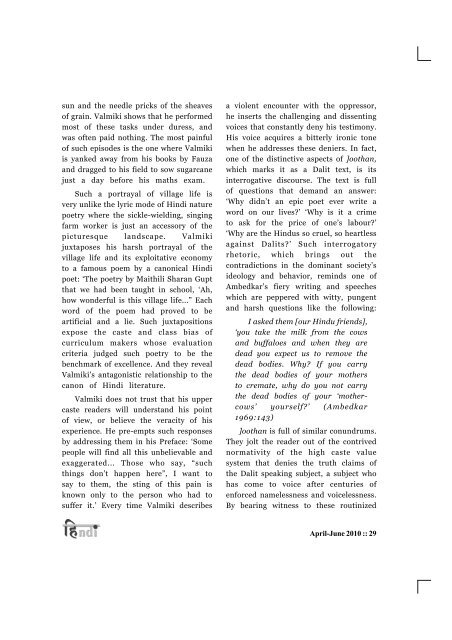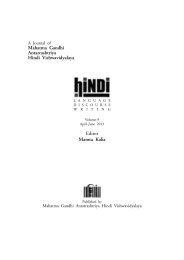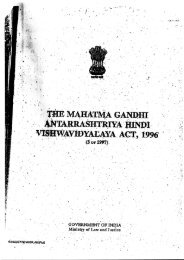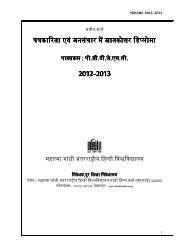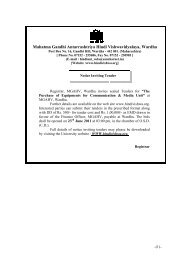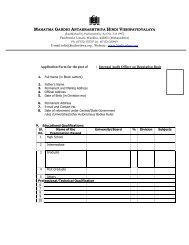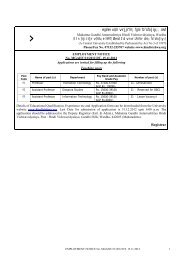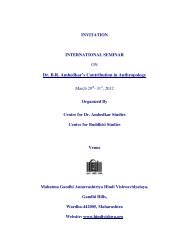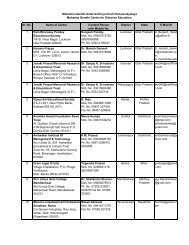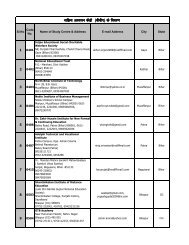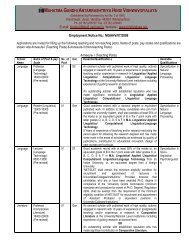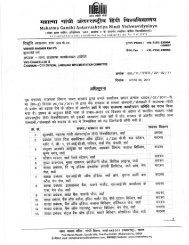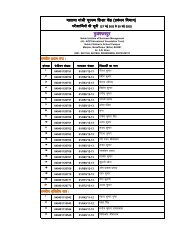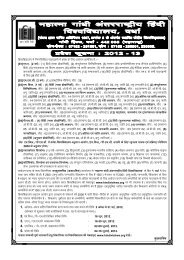Mamta Kalia
Mamta Kalia
Mamta Kalia
Create successful ePaper yourself
Turn your PDF publications into a flip-book with our unique Google optimized e-Paper software.
sun and the needle pricks of the sheaves<br />
of grain. Valmiki shows that he performed<br />
most of these tasks under duress, and<br />
was often paid nothing. The most painful<br />
of such episodes is the one where Valmiki<br />
is yanked away from his books by Fauza<br />
and dragged to his field to sow sugarcane<br />
just a day before his maths exam.<br />
Such a portrayal of village life is<br />
very unlike the lyric mode of Hindi nature<br />
poetry where the sickle-wielding, singing<br />
farm worker is just an accessory of the<br />
picturesque landscape. Valmiki<br />
juxtaposes his harsh portrayal of the<br />
village life and its exploitative economy<br />
to a famous poem by a canonical Hindi<br />
poet: ‘The poetry by Maithili Sharan Gupt<br />
that we had been taught in school, ‘Ah,<br />
how wonderful is this village life...” Each<br />
word of the poem had proved to be<br />
artificial and a lie. Such juxtapositions<br />
expose the caste and class bias of<br />
curriculum makers whose evaluation<br />
criteria judged such poetry to be the<br />
benchmark of excellence. And they reveal<br />
Valmiki’s antagonistic relationship to the<br />
canon of Hindi literature.<br />
Valmiki does not trust that his upper<br />
caste readers will understand his point<br />
of view, or believe the veracity of his<br />
experience. He pre-empts such responses<br />
by addressing them in his Preface: ‘Some<br />
people will find all this unbelievable and<br />
exaggerated... Those who say, “such<br />
things don’t happen here”, I want to<br />
say to them, the sting of this pain is<br />
known only to the person who had to<br />
suffer it.’ Every time Valmiki describes<br />
a violent encounter with the oppressor,<br />
he inserts the challenging and dissenting<br />
voices that constantly deny his testimony.<br />
His voice acquires a bitterly ironic tone<br />
when he addresses these deniers. In fact,<br />
one of the distinctive aspects of ]oothan,<br />
which marks it as a Dalit text, is its<br />
interrogative discourse. The text is full<br />
of questions that demand an answer:<br />
‘Why didn’t an epic poet ever write a<br />
word on our lives?’ ‘Why is it a crime<br />
to ask for the price of one’s labour?’<br />
‘Why are the Hindus so cruel, so heartless<br />
against Dalits?’ Such interrogatory<br />
rhetoric, which brings out the<br />
contradictions in the dominant society’s<br />
ideology and behavior, reminds one of<br />
Ambedkar’s fiery writing and speeches<br />
which are peppered with witty, pungent<br />
and harsh questions like the following:<br />
I asked them [our Hindu friends],<br />
‘you take the milk from the cows<br />
and buffaloes and when they are<br />
dead you expect us to remove the<br />
dead bodies. Why? If you carry<br />
the dead bodies of your mothers<br />
to cremate, why do you not carry<br />
the dead bodies of your ‘mothercows’<br />
yourself?’ (Ambedkar<br />
1969:143)<br />
]oothan is full of similar conundrums.<br />
They jolt the reader out of the contrived<br />
normativity of the high caste value<br />
system that denies the truth claims of<br />
the Dalit speaking subject, a subject who<br />
has come to voice after centuries of<br />
enforced namelessness and voicelessness.<br />
By bearing witness to these routinized<br />
April-June 2010 :: 29


